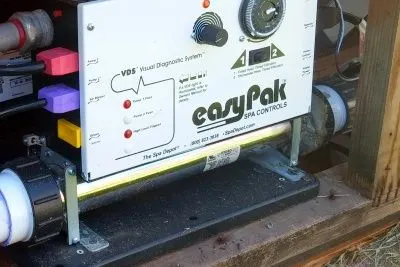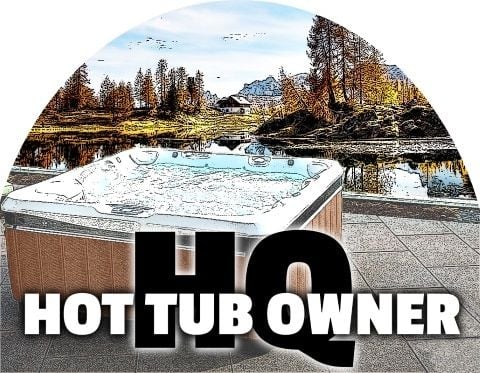As a hot tub owner, you know that maintaining its components is crucial to ensure its functionality and longevity. One important part that requires attention is the hot tub heater. The average lifespan of a hot tub heater can vary depending on several factors – so how long does a hot tub heater last?
Generally, hot tub heaters can last 8-15 years. Higher-end models equipped with corrosion-resistant materials tend to last longer. Consistently balancing the pH and alkalinity can also ensure longevity.
In this section, we’ll discuss the typical life span of a hot tub heater and the key factors that affect its longevity. Additionally, we’ll provide helpful tips to prolong its functionality and ensure efficient heating of your spa.

Key Takeaways:
- The average lifespan of a hot tub heater depends on various factors.
- Regular maintenance can help extend its lifespan.
- Recognizing signs of a failing heater is crucial to prevent further damage.
- Replacing a hot tub heater requires careful consideration of compatibility and energy efficiency.
- Efficient heating can be achieved through proper maintenance and insulation of your spa.
Understanding Hot Tub Heaters
To fully comprehend the longevity of a hot tub heater, it’s crucial to grasp its functionality. A hot tub heater is responsible for heating the water in your spa and maintaining a comfortable temperature.
The most commonly used type of heater for hot tubs is an electric resistance heater, which uses a heating element to warm the water. The heating element is made up of a metal coil that heats up when an electric current is passed through it. As the water flows over the heating element, it gets warm.
Many hot tub heaters also feature a temperature sensor that monitors the water temperature and activates or deactivates the heater as needed, ensuring consistent and safe heating. Another essential component of the hot tub heater is the thermostat, which controls the temperature of the water, regulating how much heat it receives from the heating element.
The durability of a hot tub heater depends on various factors such as usage patterns, manufacturing quality, and maintenance practices. In the next section, we’ll explore the average lifespan of a hot tub heater and the factors that affect its longevity.
Average Lifespan of a Hot Tub Heater
Hot tub heaters are an essential component of your spa, responsible for heating the water to the desired temperature. The typical lifespan of a hot tub heater ranges from 5 to 15 years, depending on various factors. Proper maintenance can prolong the lifespan of your heater and ensure efficient performance.
The factors that can affect the longevity of your hot tub heater include:
- Regular Maintenance: Regularly cleaning, monitoring electrical connections and replacing faulty parts can extend the life of your heater.
- Water Chemistry: High levels of mineral content, pH imbalances, and other water chemistry issues can accelerate the corrosion of the heater element.
- Usage Patterns: Frequent usage of the spa or prolonged periods of hot water temperatures can shorten the heater’s lifespan.
- Quality of the Heater: A heater made from high-quality materials, such as titanium, will have better durability and a longer lifespan.
It’s essential to be aware of these factors and monitor your hot tub heater’s performance regularly.

Expert Tip:
One way to extend your hot tub heater’s life is to keep the water balanced chemically. Ensure the pH and alkalinity levels are within the recommended range, and use quality chemicals to maintain a healthy spa.
Signs of a Failing Hot Tub Heater
When your hot tub heater is on the brink of failure, there are several warning signs that you can look for. Ignoring these symptoms could result in costly repairs, decreased performance, and even permanent damage to your spa. Don’t let a failing heater put a damper on your soaking experience – here are some common signs to watch out for:
Inconsistent Water Temperature
If your hot tub is struggling to maintain a consistent water temperature, it could indicate a failing heater. When the water is too hot or too cold, it can be uncomfortable, reducing the overall enjoyment of your spa. Check your thermostat settings and ensure your heater is working correctly to avoid further issues.
Strange Noises
If you hear unusual sounds like popping, cracking, or whistling coming from your hot tub, this could be a sign of a failing heater. The noises may indicate a build-up of minerals or scaling on the heating element, reducing its efficiency. If left unaddressed, this could lead to more severe damage and a costly repair bill.
Frequent Resets
If your hot tub’s heater repeatedly shuts off or requires frequent resets, it could be time for a replacement. A failing heater may be unable to produce enough heat to keep the water at a consistent temperature, leading to automatic resets. This could indicate a serious issue, and you should seek help from a professional.
Pro Tip: Regular maintenance, including cleaning and water chemistry adjustments, can help prevent premature failure and extend the lifespan of your heater.
Replacing Your Hot Tub Heater
When your hot tub heater is beyond repair, it’s time to start shopping for a replacement. Here are a few factors to consider when selecting a new hot tub heater:
- Size: Ensure you select a heater that is compatible with your spa’s size and water volume to guarantee optimal heating performance.
- Compatibility: Check the compatibility of the new hot tub heater with your existing equipment, such as the pump and control system, to avoid additional modifications or replacements.
- Energy Efficiency: Opt for an energy-efficient product that meets your heating requirements while keeping your energy costs in check. Consider heaters with features such as programmable timers and built-in thermostats.
Replacing your hot tub heater can be a daunting task, but it doesn’t have to be. With proper research and careful consideration, you can find a heater that meets both your needs and budget, and extends the lifespan of your hot tub.
Prolonging Your Hot Tub Heater’s Life
Regular maintenance is crucial to keep your hot tub heater running efficiently and extending its lifespan. Follow these hot tub heater maintenance tips to keep it functioning optimally for many years to come:
- Regular cleaning: Dirt, debris, and scale buildup can clog or damage the heating element, reducing efficiency and shortening the heater’s lifespan. Regularly clean the hot tub’s filters and remove any buildup with a non-abrasive cleaner to avoid damaging the heater’s surface.
- Water chemistry balance: Balanced water chemistry is essential to prevent corrosion and mineral buildup that can damage the heater’s components. Test the water regularly and maintain proper pH, alkalinity, and sanitizer levels.
- Professional servicing: Schedule regular professional inspections to detect any issues early and ensure proper functioning of the heater. A trained technician can recognize signs of wear and tear, clean hard-to-reach areas, and conduct more thorough repairs when needed.
By following these hot tub heater maintenance tips, you can keep your heater running smoothly and prolong its lifespan.
Ensuring Efficient Hot Tub Heating
To maintain your hot tub heater’s efficiency and reduce energy consumption, it’s essential to adopt these maintenance tips:
- Optimize water flow: Keep the water flowing smoothly through your hot tub’s plumbing to ensure that the heater doesn’t overwork. Clean the filter regularly and remove any blockages.
- Insulate your hot tub: Use a high-quality cover and insulating materials to prevent heat loss and reduce the workload of your heater.
- Check temperature settings: Avoid setting your thermostat too high, as this can lead to increased energy consumption and wear on your heater components. The recommended temperature is between 100-102°F.
- Flush hot tub plumbing: Over time, your hot tub’s plumbing can become clogged with debris and bacteria, leading to inefficient heating. Flushing the system periodically can keep it clean and running smoothly.
- Maintain water chemistry: Properly balanced water chemistry can prevent mineral buildup in your hot tub’s plumbing and prolong your heater’s lifespan. Test the chemistry regularly and adjust as necessary.
By following these hot tub heater maintenance tips, you can ensure that your spa operates efficiently and prolong your heater’s lifespan.

Conclusion
Now that you know the average lifespan of a hot tub heater and the crucial factors that affect their durability, you can make informed decisions on when to replace your unit. Remember to stay vigilant for signs of a failing heater, and do not hesitate to take action when necessary. With proper maintenance and care, you can extend the lifespan of your hot tub heater and enjoy efficient heating for years to come.
FAQ
What are the factors that affect a hot tub heater’s lifespan?
Several factors can influence the longevity of a hot tub heater. These include regular maintenance, water chemistry balance, usage patterns, the quality of the heater, and the overall condition of the spa system.
How often should I replace my hot tub heater?
It is generally recommended to consider replacing your hot tub heater every 5 to 10 years, even if it is still functioning. This proactive approach helps prevent unexpected breakdowns and ensures the efficient operation of your hot tub.
What are the signs of a failing hot tub heater?
Some common signs indicating a failing hot tub heater include inconsistent water temperature, weak or no heat, unusual noises coming from the heater, frequent resets, and a decline in overall heating performance. If you notice any of these issues, it may be time to look into replacing your heater.
How do I replace my hot tub heater?
When it’s time to replace your hot tub heater, it is best to consult a professional technician or contact the manufacturer for guidance. They can help you select a compatible replacement heater that suits your hot tub’s specifications. It’s important to consider factors such as size, compatibility, and energy efficiency when choosing a new heater.
How can I prolong the lifespan of my hot tub heater?
To prolong the lifespan of your hot tub heater, regular maintenance is crucial. This includes cleaning the filter regularly, maintaining proper water chemistry balance, ensuring good water circulation, and scheduling professional servicing when needed. Taking these steps will help prevent unnecessary strain on the heater and extend its service life.
What maintenance tips can help ensure efficient hot tub heating?
To ensure efficient hot tub heating, it’s important to optimize water flow by cleaning the jets, maintaining the right water chemistry balance, and regularly checking and replacing the heater element, if necessary. Additionally, insulating your hot tub and covering it when not in use can help retain heat and reduce strain on the heater.
- Relxtime 6 Person Square Inflatable Hot Tub (2024 Review) - March 11, 2024
- Hot Tub Cover Mold – Complete Cleaning Guide - February 20, 2024
- Hot Tub Heater Longevity: How Often Should You Replace? - December 14, 2023
